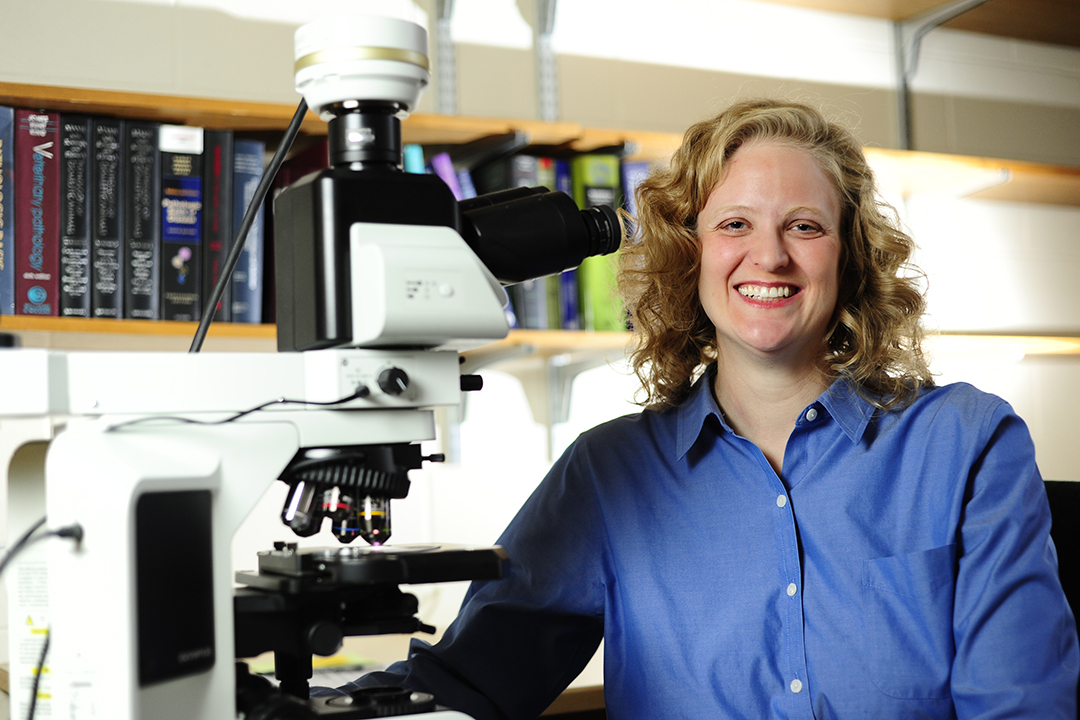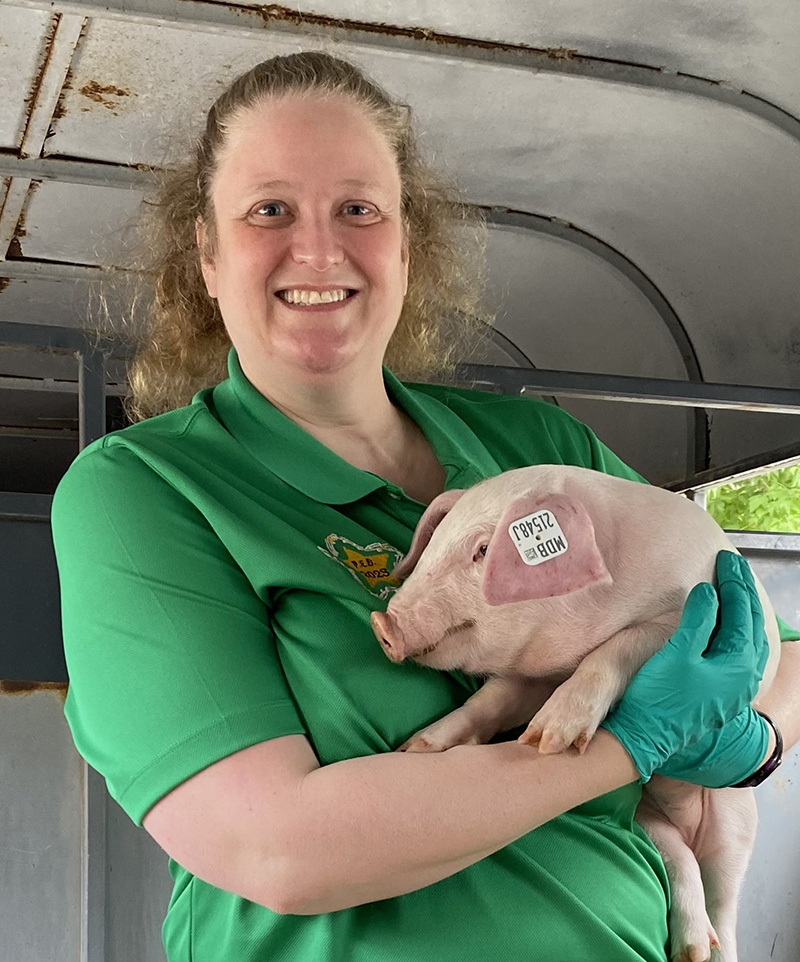
Detmer settles into council chair at USask
Dr. Susan Detmer (DVM, PhD) came for the conference, and stayed for the career.
By James ShewagaAfter coming to Saskatoon for a pathology conference in 2007, Detmer has become one of the leading researchers for influenza in pigs, through her work in the Western College of Veterinary Medicine (WCVM) at the University of Saskatchewan (USask).
“I came up to Saskatoon to present during my PhD and residency program, and I really liked the people here and the faculty in the Department of Veterinary Pathology, so when there was an opening I applied because it was right when I was finishing my PhD. It was serendipity,” says Detmer, who was born in Nebraska and raised in Minnesota, and officially became a Canadian citizen in 2019.
“Of the jobs I was offered, it was exactly what I wanted to do: a mixture of research, some diagnostic work, and the type of teaching that I wanted to do. So, it was the perfect position for me.”
Detmer has now taken on a new position, agreeing to serve for the next two years as chair of University Council, one of the three governing bodies at USask along with the Board of Governors and Senate.
“It was one of those, being pushed in front of the tank in the middle of the battle, kind of things,” she says with a chuckle. “But I do have a willingness to serve and I have an interest in how things are governed in the university. Both of my parents have PhDs and have had faculty positions, so it’s in my blood and just understanding how things work, that’s why I joined University Council because I was interested in understanding governance within the university …. Because I am interested in how things run, maybe people hope that I know how to run a meeting!”
Detmer is determined to make a difference in her role, with council having direct influence on academic affairs and oversight, and council meetings serving as one of the few places where a faculty member can directly question a senior leader, including the president and provost. For Detmer, representing 2,000 faculty members across campus is a responsibility she relishes.
“I have a problem with disingenuous consultation,” says Detmer, who chaired her first monthly University Council meeting on Nov. 18. “I have put myself out there saying when consultation happens, they need to get feedback and that is an ongoing issue. So, since I’ve started this chair, we have started to making sure the process of getting feedback is laid out, so that people understand who to give feedback to, so that we can monitor the feedback and make sure it gets to the people it is supposed to get to.”
Detmer says she “has a passion for parliamentary procedure” and is working toward becoming a certified parliamentarian as part of her volunteer work with P.E.O. International, which supports scholarships, grants and loans for Canadian and American women at post-secondary institutions. Detmer serves on the board for the Alberta-Saskatchewan Provincial Chapter of P.E.O. International, which has provided scholarship support for a number of USask students over the past few years.
For Detmer, the university has provided her with the perfect mix of teaching and serving as a mentor for promising students as an associate professor in the Department of Veterinary Pathology, while also conducting world-class research in her lab. Detmer is the only researcher in Western Canada conducting critical surveillance of influenza viruses in swine, and her lab is one of only two in the country that handle vaccine development for pig producers.
“I have connections with veterinarians all across Canada and I get samples from farms throughout Canada, even from Quebec, and I process those samples in my lab,” says Detmer, who contributes to the global Influenza Research Database, which compiles influenza viral sequences from all species, including humans.
“Our lab is one of the only labs in all of Canada that grow the viruses, so I do the virus growth and then provide the virus to make regional swine vaccines.”

Detmer’s surveillance and vaccine work is crucial to maintaining the health of Canadian swine herds and helping pig producers avoid costly economic impact from serious influenza breakouts.
“Every spring, I start looking at what happened last year and I pick out what the trend is and what the most recent strains that will cover that and I make recommendations (for new vaccines),” says Detmer.
“Because influenza is an endemic disease, it’s everywhere and seasonally every November and March there are two spikes in humans, and it’s the same in pigs. It changes every year, just like COVID. They talk about these variants, and influenza is constantly changing as well. Influenza is a respiratory virus that can infect humans and pigs, and can move back and forth. So, for me the COVID-19 pandemic actually has been an epidemiological real-life scenario.”
Detmer’s connection to pigs and veterinary medicine goes back to her childhood, a decade before she began pursuing a career in the field.
“I was pretty sure I was going to be cat vet when I was 10. But my family has raised pigs for over a hundred years — my grandmother won the Grand Champion Show Pig Prize at the Nebraska State Fair — so pigs are definitely something my family has a history with,” says Detmer, who earned her Doctor of Veterinary Medicine degree and her PhD at the University of Minnesota.
“I was more interested in cattle at first, but in Minnesota there are a lot more pigs in the diagnostic labs, so I really became familiar with their diseases. They were calling me, I guess.”
After more than a decade at USask, Saskatoon has become home for Detmer, with friends on and off campus, and colleagues who support her work as a researcher and associate professor in WCVM, and a faculty leader at USask with University Council.
“I am in my mid-career now and taking on these types of administrative roles — while being able to keep my teaching and my research going at the same time — is certainly something that I wanted to do,” says Detmer, who was the first researcher from a Canadian institution to receive the Boehringer Ingelheim Advancement in Porcine Reproductive and Respiratory Syndrome (PRRS) Research Award in 2013.
“At this point, I see no reason to move. I have long-term plans for my laboratory and research here. Once you get momentum, it is hard to move around. I have plans for the next several years already in place, so there is absolutely no reason for me to make any changes career-wise. I feel at home here.”
